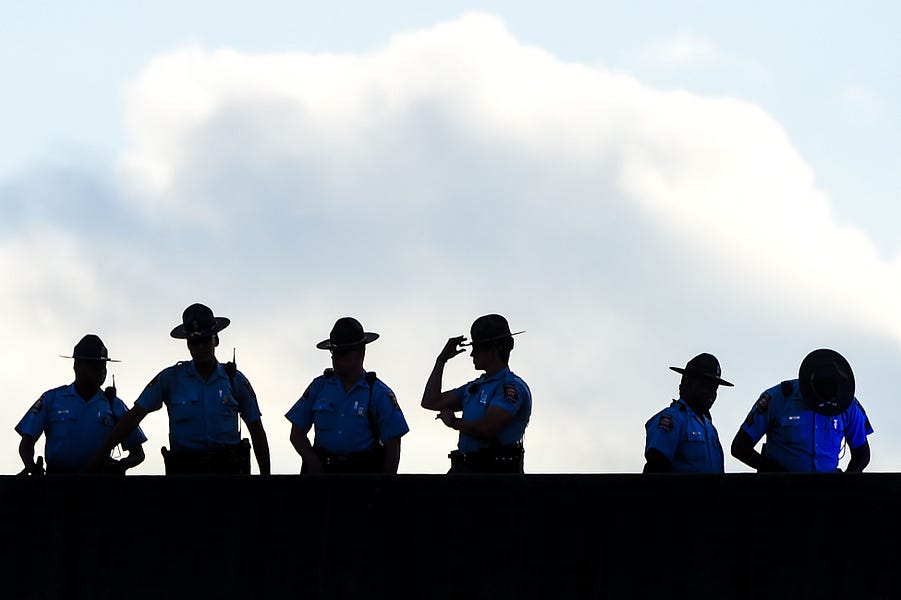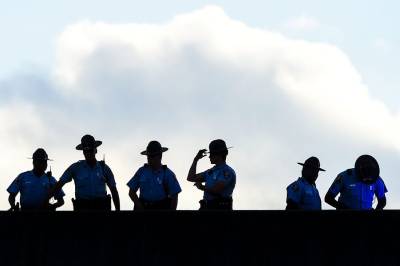“Policing itself started out as slave patrols. We know that,” Rep. James Clyburn declared in an interview with Fox News’s Bret Baier. Clyburn, the House majority whip, is the third highest ranking Democrat in Congress. He's widely respected. And he's wrong. Or, to be more generous, he's being irresponsibly sloppy in making a point he’s right about.
But he’s not alone.
A story in Yahoo News makes a similar claim. Discussing police abuses, reporter Marquise Francis writes, "The injustice harkens back to the very origins of policing in the U.S., in volunteer patrols charged with keeping African-Americans in their place and hunting runaway slaves.”
A USA Today article headlined, “Law enforcement's history of racism; First police departments date back to slave patrols”: “Across the U.S., black Americans lived in fear of law enforcement officials armed with weapons who monitored their every behavior, attacked them on the street and in their homes, and killed them for the slightest alleged provocation.”
Wenei Philimon, the author, continues, “These organized groups of white men known as slave patrols lay at the roots of the nation's law enforcement excesses, historians say, helping launch centuries of violent and racist behavior toward black Americans, as well as a tradition of protests and uprisings against police brutality.”
One has to read deep into the piece to discover the important caveat to a legitimately significant historical fact. Yes, policing in Southern slave states has some roots in slave patrols.
But policing doesn’t.
Policing—enforcing the law, preventing crime, apprehending criminals—has a very long tradition of existence. I don't know where it started, but for our purposes we can note that Augustus Caesar, born in 27 B.C., created the cohortes urbanae near the end of his reign, to police Ancient Rome. Policing in England takes rudimentary form with Henry II's proclamation of the Assize of Arms of 1181. In the 1600s England established constables and justices of the peace to oversee them. The Metropolitan Police Act created the first recognizable police force in the U.K. in 1829.
Meanwhile, in America the first constables were created in the 1630s in what came to be known as New England. Boston has the oldest “modern” police department. It was created in 1838. New York and Philadelphia soon followed.
They were not created to search for runaway slaves.
It is true that slave patrols were created in slave states and they were an early form of policing. How much that taints the police forces of modern-day Atlanta or Charleston or any other state is clearly up for discussion.
But it strikes me as somewhat far-fetched to argue that police in Minnesota or New York are imbued with the spirit of southern militias tasked with tracking down slaves. It even strikes me as a bit of a stretch to claim that the slave patrols of the 1840s have a lot of bearing on the actions of police departments in majority black cities like Atlanta.
Indeed, there's something uncomfortable to the idea that attempts to prevent rape, murder, robbery, etc., have some obvious racist intent behind them. Black people are just as deserving of protection from crime as anybody else.
Moreover, the attempt to paint policing—all policing "across America," in former slave states and free states alike—as the poisoned fruit of American slavery is problematic. First, every decent country has police, including the non-white ones. Second, the South lost the Civil War. Under Reconstruction, the Radical Republicans imposed the North's will on the South. The slave patrols were disbanded. Some patrollers did indeed become police. But so did African-Americans. Meanwhile, the evil energies of the patrols were primarily expressed elsewhere—in the form of vigilante groups like the KKK. When Reconstruction ended, the South imposed tyrannical Jim Crow laws.
In other words, the history is complicated. But the important point is that it is history, not America today.
Rep. Val Demings, reportedly on Joe Biden's vice presidential shortlist, is the former chief of police of Orlando, Florida, and an African American. Do people really mean to say she ran the moral equivalent of a slave patrol? Really?
One of the arguments made by both advocates of reasonable police reform—like Demings—as well as proponents of abolishing the police is that cops do too much. They reasonably note that police are expected to be first-responding mental health professionals, dealing with homeless people, possible suicides, etc. Why send people with guns to do that?
It's a fair question. But by even asking it, you're conceding that police are not, in fact, behaving like slave patrols.
Photograph by Chandan Khanna/AFP/Getty Images.







Please note that we at The Dispatch hold ourselves, our work, and our commenters to a higher standard than other places on the internet. We welcome comments that foster genuine debate or discussion—including comments critical of us or our work—but responses that include ad hominem attacks on fellow Dispatch members or are intended to stoke fear and anger may be moderated.
With your membership, you only have the ability to comment on The Morning Dispatch articles. Consider upgrading to join the conversation everywhere.